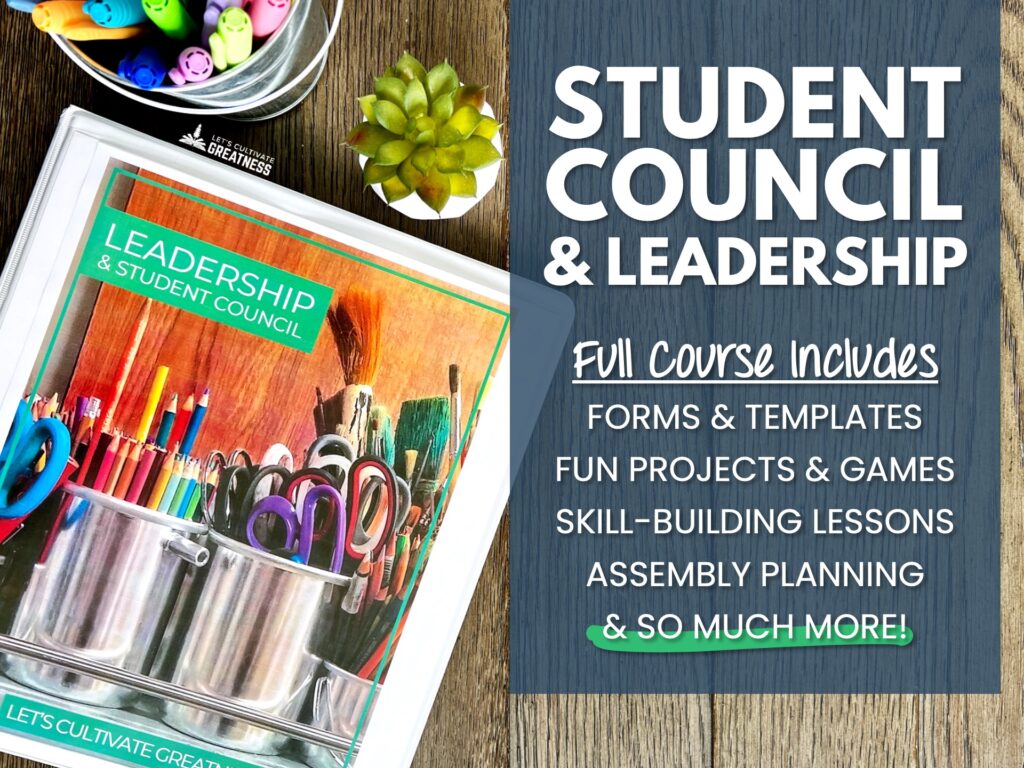Perhaps your school doesn’t have a student council, and you’ve been tasked to create one. Or you have an existing program, but it needs a massive overhaul. Either way, welcome! You’re in the right place!
Even though I took over an already-established program years ago, I felt like I was starting from complete scratch. So, no matter your situation, these are likely the most essential questions you’ll have when setting up your program.
Click below to jump to your most burning question first.
What is a student council, and what does it do?
What are the main goals of a student council?
What activities does a student council plan?
What are the first steps for a new student council?
What’s the role of a student council advisor?
Do we need a student council constitution?
When should our student council meet?
What is a Student Council, and what does it do?
In short, it’s a representative government of students that makes decisions about activities, clubs, assemblies, and other school-wide things. It should make all students feel heard and included in a positive school experience. Beyond that, there are many ways a student council can exist!
Typically, officers serve one-year elected terms and meet regularly. They also meet with school administrators about their concerns and ideas and host various events during and outside the school day.
A student council can be an extracurricular, meeting before or after school. Or it can be part of a credit-bearing class, which may include non-council member students.
Just know that if you don’t meet within your school day, your group won’t be able to take on nearly as many things. So, be realistic when planning your calendar.
A middle or high school student council is usually tasked with things like:
- Creating a positive and healthy school culture with events that include everyone
- Being a liaison between students, staff, and the community
- Practicing representative democracy by representing the views of students in decision-making
If you meet as a formal class, you should also be able to weave in formal teamwork, interpersonal, and executive function skill-building lessons.
What are the main goals of a student council?
Let’s be clear: the above tasks aren’t the goal, just the outputs.
The first big goal is to create a space for teens to vote on, advocate for, plan, and act on real things they care about. Essentially, it is to practice being active participants in democracy.
The council and what all it accomplishes (and doesn’t) is theirs. Your student council leaders are responsible for their budgets, calendars, events, and meeting agendas. Not you. As their advisor, you’re there to guide and support them.
Second, through all these experiences, students will learn and strengthen various work and social skills that will make them successful in life. For example, planning large events and speaking confidently with others.
To create a program that is more than poster-making and pep assembly planning, check out this post where I lay out my three-part framework for creating a service leadership-centered program.
What activities does a student council plan?
Really, anything your officers want! But here are the common events:
- Assemblies, both spirit assemblies and formal ones like for Veterans’ Day
- Homecoming and other spirit weeks
- Hallway and common area bulletin boards
- Dances, movie nights, field days, or talent shows
- Lunchtime activities like class competitions
- Service projects or fundraisers
- Staff recognition and appreciation days
- School-wide kindness or school spirit activities
- Any other school traditions
To start filing your calendar, check out these blog posts with ideas for the whole school year – Back to School, Fall, Winter, Spring, and End of Year.
Or sign up for my newsletter that delivers you ideas for the upcoming month directly to your inbox!
But don’t get ahead of yourself. Now that you have a good idea of what your council can be, it’s time to create the foundation. The next questions will help you do that!
What are the first steps for a new student council?
These will differ depending on whether you’re at a brand-new school, reviving a program at an existing school, or taking over as the advisor of an established program.
First, meet with your admin and either the current officers or interested students, if you don’t have any yet, to discuss everyone’s vision.
Second, contact other advisors in your area. Ask how they structure things and for their best advice. See if they can give you a tour of their space for more ideas.
Third, if you’re new, gather up as much institutional knowledge from the outgoing advisor and long-time staff members. What are the school traditions? What events is the student council responsible for?
Fourth, figure out the status of your constitution. Do you have one? Where is it? Do you need to draft one? See below for more information on drafting a constitution.
Fifth, start planning out your calendar for the year! Put have-to-do items down first, then fill in with fun-to-do and other ideas you, admin, and student come up with.
You may also want to read these blog post: First 5 Actions You Need to Take as a Student Council Advisor, Student Council Calendar Tips That Will Save Your Sanity, and 5 Back-to-School Ideas to Create an Amazing Student Council.
What’s the role of a student council advisor?
An advisor is not the same as a coach, nor is it quite like being a teacher. You are providing your student leaders with scaffolding for their decision-making. This means you have to separate yourself a bit.
But you also need to be able to predict and plan for what’s coming, which is hard to do in your first year. So, give yourself plenty of grace.
That’s why I made a Student Council Starter Kit. This has all the forms, templates, and how-to guides to smoothly run your program from the start. I would have done just about anything for something like this when I was first tapped to be the advisor!
Also, as the advisor, you are the contact person. You’ll be the person admin, secretaries, district people, and community members will email with ideas and questions.
As you can imagine, being able to plan ahead and being organized are the two most essential skills you need as a student council advisor. For my full list of tips, check out this blog post: 9 Things Great Student Council Advisors Do.
Do we need a student council constitution?
Yes! No question. If you’re starting from scratch, give yourself some leeway, say a semester, to get one drafted and set your program up. But it is priority two right after finding some kids who want to join.
If your council already exists but doesn’t have a constitution, or the existing one is severely lacking, clear the calendar to draft one. A constitution is what makes your council legitimate.
It also helps you mitigate unnecessary crises because it will have procedures and powers laid out to address sticky situations like removing an officer or dealing with a micro-managing principal.
So, send out an all-call for staff and students to join a committee to create or revise your constitution. This cannot be done behind closed doors. You can use my constitution template kit to get started.
When you have a final draft, send it to your principal, district admin, and or school board for approval. Then to your full student body for a ratification vote.
If you need help, head over to this blog post on how to make a great student council constitution.
Should we hold student council elections?
Also, no question, yes! This goes together with having a constitution that outlines your election requirements. A constitution gives legitimacy to the concept of your student council, but elections give it so in practice.
Once your program is official (a ratified constitution, accounts set up, an approved charter, etc.), hold elections, even if it’s midway through the year.
Don’t worry about if enough students will sign up to run. Even if every race is uncontested, those officers must be properly elected into their positions.
Head to How to Organize a Student Council Election Without the Stress for a timeline of what exactly to do and when.
When should our student council meet?
Regularly. This is core to being a representative democracy. They should hold formal meetings at least monthly. This usually works well for middle school programs that don’t necessarily have the volume of business to address.
High school councils, with many sports teams and clubs and a packed calendar, will likely need to meet biweekly.
Also, under the “when” of student council meetings, pick a time during the day when all students can attend. Try to meet during any homeroom or flex time.
Otherwise, before school may be your best bet. Not only do your officers and any class or organization reps need to attend, but also any students who may want to attend. Meetings need to be open for anyone to attend.
Check out this post for more tips on running a successful student council meeting.
I hope these tips have given you a good place to start building a student council program you and your officers are proud of! Also, be sure to check out my done-for-you Leadership Course & Student Council Program Bundle, which has everything from templates and forms to project kits to skill-building lessons.

Image credit: Laura Rivera





